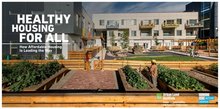0
Report
Community:
As the United States rapidly becomes both a more diverse and unequal nation, policymakers face the urgent challenge of confronting growing wealth gaps by race and ethnicity. To create a more equitable and secure future, we must shift away from public policies that fuel and exacerbate racial disparities in wealth. But which policies can truly begin to reduce our country’s expanding racial divergences?
Authored by: Demos and The Institute on Assets and Social Policy (IASP)
Topics: Housing, Legislation & Policy, Racial inequalities, Research
 Shared by Housing Is
Shared by Housing Is
Housing Is posted a
on Apr 26, 2019
Demos and The Institute on Assets and Social Policy (IASP)
As the United States rapidly becomes both a more diverse and unequal nation, policymakers face the urgent challenge of confronting growing wealth gaps by race and ethnicity.
0
Report
Community:
Apr 1, 2019
College Promise programs aim to make students believe they can afford college, and to give them the opportunity to go to college and earn degrees without taking on significant debt. At the core of all College Promise programs is a scholarship: All eligible College Promise students receive scholarships that may cover up to 100 percent of tuition and fees at postsecondary institutions. Additionally, many Promise programs are designing, implementing, and refining additions to their models by providing students with support services once they enroll in college. MDRC’s College Promise Success Initiative (CPSI) provides important lessons for Promise programs interested in including such services.This brief shares early lessons from CPSI about how different Promise programs are designing, implementing, and refining their models with embedded student services in mind.
Authored by: Jacklyn Willard, Andrea Vasquez, and Marco Lepe for MDRC
Topics: Education, Low-income, Post-secondary, Research, Youth
 Shared by Housing Is
Shared by Housing Is
Housing Is posted a
on Apr 24, 2019
Jacklyn Willard, Andrea Vasquez, and Marco Lepe for MDRC
College Promise programs aim to make students believe they can afford college, and to give them the opportunity to go to college and earn degrees without taking on significant debt.
0
Report
Community:
Apr 20, 2019
Detroit’s Promise program was designed to encourage college attendance among some of the nation’s most underserved students, those in Detroit, Michigan. The next step was to help students succeed once they enrolled in college. To do so, MDRC and the Detroit Promise partnered to create the Detroit Promise Path, an evidence-based student services program. Detroit Promise Path students begin meeting with college coaches in the late summer before their first semester of college. They are given an incentive to attend coaching meetings in the form of a monthly gift card refilled with $50 each month that they meet with coaches as directed. The program lasts all year, including summer semesters, when students are encouraged to enroll in summer classes or engage in a local summer jobs program. The entire operation is supported by a management information system.
Authored by: MDRC
Topics: Education, Low-income, Midwest, Post-secondary, Research
 Shared by Housing Is
Shared by Housing Is
Housing Is posted a
on Apr 24, 2019
Detroit’s Promise program was designed to encourage college attendance among some of the nation’s most underserved students, those in Detroit, Michigan. The next step was to help students succeed once they enrolled in college.
0
Report
Community:
Apr 1, 2019
The goal of this report is to reveal those 21st century patterns of metropolitan change and development. Broadly speaking, this report analyzes neighborhood change, at a census-tract and metropolitan level, between 2000 and 2016. Its analysis includes the entire United States but focuses on the 50 largest metropolitan areas.
Authored by: Institute on Metropolitan Opportunity at the University of Minnesota Law School
Topics: Community development, Research
 Shared by Mica O'Brien
Shared by Mica O'Brien
Mica O'Brien posted a
on Apr 18, 2019
Institute on Metropolitan Opportunity at the University of Minnesota Law School
The goal of this report is to reveal those 21st century patterns of metropolitan change and development. Broadly speaking, this report analyzes neighborhood change, at a census-tract and metropolitan level, between 2000 and 2016.
0
Report
Community:
Jan 31, 2019
The EMPOWERED study, conducted on behalf of the Assistant Secretary for Planning and Evaluation (ASPE) at the U.S. Department of Health and Human Services, examines the use of performance measures, work requirements and child support cooperation requirements across human services programs. This issue brief is based on three case studies and provides local perspectives on the challenges and opportunities for aligning performance indicators across a variety of federal programs promoting self-sufficiency.
Authored by: Elizabeth Brown, Kara Conroy, and Gretchen Kirby for Mathematica
Topics: Legislation & Policy, Metrics, Research
 Shared by Housing Is
Shared by Housing Is
Housing Is posted a
on Apr 15, 2019
Elizabeth Brown, Kara Conroy, and Gretchen Kirby for Mathematica
The EMPOWERED study, conducted on behalf of the Assistant Secretary for Planning and Evaluation (ASPE) at the U.S. Department of Health and Human Services, examines the use of performance measures, work requirements and child support cooperation requirements across human services programs.
0
Report
Community:
Jan 1, 2019
This report focuses on the homelessness and health care use of older homeless adults in New York City, specifically those 55 years of age or older. Recent evidence suggests a unique cohort effect of postWorld War II “baby boomers” born between 1955 and 1965 who have shown a disproportionately high
risk of homelessness over the last two decades.
Authored by: Dennis Culhane, Dan Treglia, Randall Kuhn, Kelly Doran, Eileen Johns, and Maryanne Schretzman for Actionable Intelligence for Social Policy
Topics: Cost effectiveness, East Coast, Health, Homelessness, Housing, Low-income, Research, Seniors
 Shared by Housing Is
Shared by Housing Is
Housing Is posted a
on Apr 11, 2019
Dennis Culhane, Dan Treglia, Randall Kuhn, Kelly Doran, Eileen Johns, and Maryanne Schretzman for Actionable Intelligence for Social Policy
This report focuses on the homelessness and health care use of older homeless adults in New York City, specifically those 55 years of age or older.
0
Report
Community:
Jan 1, 2019
This report is intended to accompany a report entitled The Emerging Crisis of Aged Homelessness: Could Proposed Housing Solutions Be Funded from Avoidance of Excess Hospital and Nursing Home Costs?, which reports on findings from a multi-site study involving the analysis of data from Boston, Los Angeles and New York City. That report is motivated by recent evidence documenting a cohort effect in the single adult homeless population, wherein persons born between 1955 and 1964 have faced a disproportionate risk of homelessness over the past two decades.
Authored by: Thomas Byrne, Daniel Miller, and Jae Quinn for Actionable Intelligence for Social Policy
Topics: Cost effectiveness, East Coast, Health, Homelessness, Housing, Low-income, Research, Seniors
 Shared by Housing Is
Shared by Housing Is
Housing Is posted a
on Apr 11, 2019
Thomas Byrne, Daniel Miller, and Jae Quinn for Actionable Intelligence for Social Policy
This report is intended to accompany a report entitled The Emerging Crisis of Aged Homelessness: Could Proposed Housing Solutions Be Funded from Avoidance of Excess Hospital and Nursing Home Costs?, which reports on findings from a multi-site study involving the analysis of data from Boston, Los Ang
0
Report
Community:
Dec 7, 2018
This report examines health services use and population dynamics among the aging homeless population in Los Angeles. Evidence suggests that adverse health outcomes lead to homelessness, and the conditions related to homelessness lead to or exacerbate a range of health problems
Authored by: Dennis Culhane, Steve Metraux, and Randall Kuhn for Actionable Intelligence for Social Policy
Topics: Health, Homelessness, Housing, Low-income, Research, West Coast
 Shared by Housing Is
Shared by Housing Is
Housing Is posted a
on Apr 11, 2019
Dennis Culhane, Steve Metraux, and Randall Kuhn for Actionable Intelligence for Social Policy
This report examines health services use and population dynamics among the aging homeless population in Los Angeles. Evidence suggests that adverse health outcomes lead to homelessness, and the conditions related to homelessness lead to or exacerbate a range of health problems
0
Report
Community:
Apr 1, 2019
With 22 percent of the undergraduate student population comprised of parents, policymakers and institutions must explore the unique needs of this population and address the challenges that may prevent parents from attaining their degree. This includes determining what systems, services, and approaches best support their mental health needs. This brief examines opportunities for policymakers and academic institutions to adapt existing mental health services in order to meet the unique needs of students who are parents and help them complete their degree.
Authored by: Ascend: The Aspen Institute
Topics: Dual-generation, Early childhood, Mental health, Post-secondary
 Shared by Mica O'Brien
Shared by Mica O'Brien
Mica O'Brien posted a
on Apr 11, 2019
Ascend: The Aspen Institute
With 22 percent of the undergraduate student population comprised of parents, policymakers and institutions must explore the unique needs of this population and address the challenges that may prevent parents from attaining their degree.
0
Report
Community:
Apr 1, 2019
Investments in the postsecondary success of parents with young children can increase attainment of credentials leading to good jobs, bring children the benefits of high-quality learning environments, promote later college-going among children, and improve family economic security across generations. This factsheet provides figures on the student parent population based on the latest National Postsecondary Student Aid Study data.
Authored by: Ascend: The Aspen Institute
Topics: Dual-generation, Early childhood, Post-secondary, Research, Youth
 Shared by Mica O'Brien
Shared by Mica O'Brien
Mica O'Brien posted a
on Apr 11, 2019
Ascend: The Aspen Institute
Investments in the postsecondary success of parents with young children can increase attainment of credentials leading to good jobs, bring children the benefits of high-quality learning environments, promote later college-going among children, and improve family economic security across generations.
0
Podcast
Community:
This podcast episode features the work of the Hunterdon County Partnership for Health, a multi-sector coalition that includes over 60 community agencies that share a common interest in improving health in Hunterdon County, NJ. Kim Blanda is a Project Director at Hunterdon Healthcare, Dr. Rose Puelle is a Senior Director of Population Health at Hunterdon Healthcare, and Karen DeMarco is the Director of the Hunterdon County Department of Health. Together, they are working on a project funded by New Jersey Health Initiatives (NJHI) focused on healthier weight as a mechanism for improving community health. The Partnership is addressing obesity-related social determinants of health related to access and transportation, mental health and healthy behaviors.
Authored by: All In: Data for Community Health
Topics: Data sharing, Health, Nutrition, Obesity, Partnerships
 Shared by Housing Is
Shared by Housing Is
Housing Is posted a
on Apr 8, 2019
All In: Data for Community Health
This podcast episode features the work of the Hunterdon County Partnership for Health, a multi-sector coalition that includes over 60 community agencies that share a common interest in improving health in Hunterdon County, NJ. Kim Blanda is a Project Director at Hunterdon Healthcare, Dr.
0
Case study
Community:
The PHNCI Innovation Learning Community grantees spent eighteen months hard at work implementing innovations in their communities. From this community, we have been able to learn what makes an innovation work and be replicable, including leadership buy-in, cross-sector partnerships, and community engagement. In addition to learning about innovation broadly from these grantees, we also want to highlight each grantee’s individual work, including success, challenges, and lessons learned for others who may be interested in replicating their work. The case studies below, produced by NORC at the University of Chicago, are great resources for any agency looking to bring public health innovation to serve the needs of its community.
Authored by: The Public Health National Center for Innovations (PHNCI)
Topics: Data sharing, Health, Partnerships, Research
 Shared by Housing Is
Shared by Housing Is
Housing Is posted a
on Apr 8, 2019
The Public Health National Center for Innovations (PHNCI)
The PHNCI Innovation Learning Community grantees spent eighteen months hard at work implementing innovations in their communities.
0
Report
Community:
Apr 8, 2019
While the program has changed very little since its inception, the need for the program has increased. In 1975, the number of program grantees stood at 594. Today, the number of grantees stands at 1,268 as more communities qualify to receive direct program allocations. Based on a CDBG Needs Survey conducted by the CDBG Coalition (and discussed later in this report), CDBG grantees have delayed and canceled projects and reduced or permanently eliminated programs because of a lack of CDBG funds. CDBG is an important investment tool for communities and neighborhoods, but program funding must increase to meet local need to ensure CDBG grantee communities are healthy, vibrant and thriving.
Authored by:
Topics: Community development, Funding, Health, Homelessness, Housing, Legislation & Policy, Low-income, Partnerships, Research, Safety, Seniors
 Shared by Housing Is
Shared by Housing Is
Housing Is posted a
on Apr 8, 2019
A report of the CDBG Coalition
While the program has changed very little since its inception, the need for the program has increased. In 1975, the number of program grantees stood at 594. Today, the number of grantees stands at 1,268 as more communities qualify to receive direct program allocations.
0
Report
Community:
Apr 1, 2019
Thoughtful and thorough preparations for the disruptive effects of global climate change can provide a range of options for communities and households that would respect their historical assets, current and potential levels of social cohesion, desires for their own life outcomes, and opportunities for collective
action. In all cases, people and communities should exercise meaningful voice and power over decisions about where, how, and how much to adapt to local climate effects. Regardless of the combination of physical and social interventions communities adopt, inclusion and equity must be fundamental to both the process of selection and the outcomes of the options selected.
Authored by: The Urban Institute
Topics: Housing, Legislation & Policy, Research, Sustainability
 Shared by Housing Is
Shared by Housing Is
Housing Is posted a
on Apr 4, 2019
Thoughtful and thorough preparations for the disruptive effects of global climate change can provide a range of options for communities and households that would respect their historical assets, current and potential levels of social cohesion, desires for their own life outcomes, and opportunities f
0
Report
Community:
Mar 25, 2019
Use of the $35 billion in federal Community Development Block Grant Disaster Recovery funds for the 2017 hurricanes has been slow. Over a year after the first funds were appropriated, much of the money remains unspent because grantees in Florida, Puerto Rico, Texas, and the U.S. Virgin Islands are still in planning phases. Also, the Department of Housing and Urban Development doesn't have the review guidance and monitoring plans it needs for good grantee oversight. We recommended ways to improve the oversight of disaster funding and better meet disaster recovery needs.
Authored by: U.S. Government Accountability Office
Topics: Community development, Funding, Housing, Legislation & Policy, Research, Safety, U.S. Territories
 Shared by Housing Is
Shared by Housing Is
Housing Is posted a
on Mar 26, 2019
U.S. Government Accountability Office
Use of the $35 billion in federal Community Development Block Grant Disaster Recovery funds for the 2017 hurricanes has been slow. Over a year after the first funds were appropriated, much of the money remains unspent because grantees in Florida, Puerto Rico, Texas, and the U.S.
0
Podcast
Community:
This episode features two guests from the University of Chicago—Dr. Julia Koschinsky, the Executive Director for the Center for Spatial Data Science, and Dr. Nicole Marwell, an Associate Professor in the School of Social Service Administration. They are leading a project, funded by the Public Health National Center for Innovations (PHNCI), which is analyzing data on geographic access to health and human services to help government officials address gaps and maximize the impact of existing resources. The project will offer a replicable framework and tool for analyzing and improving distributions of public funds for health and human services.
Authored by: All In: Data for Community Health
Topics: Data sharing, Health, Midwest, Research
 Shared by Housing Is
Shared by Housing Is
Housing Is posted a
on Mar 19, 2019
All In: Data for Community Health
This episode features two guests from the University of Chicago—Dr. Julia Koschinsky, the Executive Director for the Center for Spatial Data Science, and Dr. Nicole Marwell, an Associate Professor in the School of Social Service Administration.
0
Podcast
Community:
Asset-based community development (ABCD) is a large and growing movement that considers local assets as the primary building blocks of community development, social capital, and health and well-being. Ron Dwyer-Voss, MA, the Owner of Pacific Community Solutions, who also happens to be a long-time friend of podcast host Peter Eckart, joined the show to discuss how ABCD draws on existing strengths of local residents, associations, and institutions to build stronger, healthier, and more sustainable communities. He shared strategies, tools, and examples of how ABCD can be used to engage community residents and support them in understanding and applying their power to improve their neighborhoods.
Authored by: All In: Data for Community Health
Topics: Asset building, Community development, Health, Partnerships
 Shared by Housing Is
Shared by Housing Is
Housing Is posted a
on Mar 19, 2019
All In: Data for Community Health
Asset-based community development (ABCD) is a large and growing movement that considers local assets as the primary building blocks of community development, social capital, and health and well-being.
0
Case study
Community:
Mar 13, 2019
Vacant properties, substandard housing, and neighborhood quality profoundly affect our health, education, and safety. Strategic code enforcement programs can serve as communities’ first line of defense for addressing deteriorating homes, vacant properties, and neighborhood decline. Strategic code enforcement programs organize critical assets, resources, and actions into a dynamic and adaptive system.
Authored by: Joe Schilling for How Housing Matters (Urban Institute)
Topics: Community development, Data sharing, Funding, Health, Legislation & Policy, Partnerships
 Shared by Housing Is
Shared by Housing Is
Housing Is posted a
on Mar 14, 2019
Joe Schilling for How Housing Matters (Urban Institute)
Vacant properties, substandard housing, and neighborhood quality profoundly affect our health, education, and safety. Strategic code enforcement programs can serve as communities’ first line of defense for addressing deteriorating homes, vacant properties, and neighborhood decline.
0
Report
Community:
Mar 1, 2019
The #RealCollege survey is the nation’s largest annual assessment of basic needs security among college students. The survey, which specifically evaluates access to affordable food and housing, began in 2015 under the Wisconsin HOPE Lab. This report describes the results of the #RealCollege survey administered at nearly half of the schools in the California Community College system in the fall of 2016 and 2018.
Authored by: The Hope Center, California Community Colleges, and #RealCollege
Topics: Homelessness, Low-income, Post-secondary, Research, West Coast, Youth
 Shared by Housing Is
Shared by Housing Is
Housing Is posted a
on Mar 13, 2019
The Hope Center, California Community Colleges, and #RealCollege
The #RealCollege survey is the nation’s largest annual assessment of basic needs security among college students. The survey, which specifically evaluates access to affordable food and housing, began in 2015 under the Wisconsin HOPE Lab.
0
Podcast
Community:
Feb 26, 2019
Many are wondering how engaged President Trump actually is on one of his campaign issues: revitalizing the nation’s crumbling infrastructure. Eyes are turning back to Congress for a broad infrastructure package. Yet there is an even bigger issue of the looming insolvency of the Highway Trust Fund. BPC’s Jake Varn is joined by former Reps. Bill Shuster (R-PA) and Joe Crowley(D-NY) to discuss these issues.
Authored by: Bipartisan Policy Center
Topics: Community development, Funding, Housing, Legislation & Policy, Transportation
 Shared by Mica O'Brien
Shared by Mica O'Brien
Mica O'Brien posted a
on Mar 12, 2019
Many are wondering how engaged President Trump actually is on one of his campaign issues: revitalizing the nation’s crumbling infrastructure. Eyes are turning back to Congress for a broad infrastructure package. Yet there is an even bigger issue of the looming insolvency of the Highway Trust Fund.
0
Report
Community:
These Principles are derived from a thematic review of mission statements and principles from 35 organizations representing the community development, health, academic, government, finance, and philanthropic sectors. More than 200 respondents provided over 1,800 comments which helped refine the Principles below.
Authored by: Build Healthy Places Network
Topics: Community development, Health, Housing, Partnerships, Racial inequalities
 Shared by Housing Is
Shared by Housing Is
Housing Is posted a
on Mar 11, 2019
Build Healthy Places Network
These Principles are derived from a thematic review of mission statements and principles from 35 organizations representing the community development, health, academic, government, finance, and philanthropic sectors.
0
Report
Community:
Healthy Housing for All: How Affordable Housing is Leading the Way explores the affordable housing industry’s achievements in creating healthier housing environments and translates them into lessons for the broader housing marketplace. The innovations in healthy affordable housing present an opportunity to replicate healthy housing successes, as well as to respond to market demand across the residential development industry.
Authored by: Urban Land Institute
Topics: Health, Housing, Legislation & Policy, Research
 Shared by Housing Is
Shared by Housing Is
Housing Is posted a
on Mar 11, 2019
Healthy Housing for All: How Affordable Housing is Leading the Way explores the affordable housing industry’s achievements in creating healthier housing environments and translates them into lessons for the broader housing marketplace.
0
Podcast
Community:
One out of every 10 young people between the ages of 16 and 24 is neither working nor in school. These “disconnected” young people face an uphill battle finding work and are at risk of economic hardship well into adulthood. Although there are many programs that aim to reconnect young people to education and employment, findings from evaluations of these programs have been mixed. The evidence base has grown substantially in the past several months, though, as studies of three programs — YouthBuild, Year Up, and New York City’s Young Adult Internship Program (YAIP) — have released new findings. MDRC’s Dan Bloom and Cynthia Miller recently wrote a brief that discusses findings from the new studies and their implications for youth programs.
Authored by: MDRC
Topics: Asset building, Low-income, Mobility, Research, Workforce development, Youth
 Shared by Housing Is
Shared by Housing Is
Housing Is posted a
on Mar 8, 2019
One out of every 10 young people between the ages of 16 and 24 is neither working nor in school. These “disconnected” young people face an uphill battle finding work and are at risk of economic hardship well into adulthood.
0
Report
Community:
The strengths and abilities children develop from infancy through adolescence are crucial for their physical, emotional, and cognitive growth, which in turn help them to achieve success in school and to become responsible, economically self-sufficient, and healthy adults. Capable, responsible, and healthy adults are clearly the foundation of a well-functioning and prosperous society, yet America’s future is not as secure as it could be because millions of American children live in families with incomes below the poverty line. A wealth of evidence suggests that a lack of adequate economic resources for families with children compromises these children’s ability to grow and achieve adult success, hurting them and the broader society.
Authored by: National Academies of Sciences, Engineering, and Medicine
Topics: Child welfare, Dual-generation, Legislation & Policy, Low-income, Research
 Shared by Housing Is
Shared by Housing Is
Housing Is posted a
on Mar 1, 2019
National Academies of Sciences, Engineering, and Medicine
The strengths and abilities children develop from infancy through adolescence are crucial for their physical, emotional, and cognitive growth, which in turn help them to achieve success in school and to become responsible, economically self-sufficient, and healthy adults.
0
Report
Community:
The monthly benefits provided by SNAP enhance the food purchasing power of eligible low-income individuals and families. However, as described by many studies, including one by the Institute of Medicine, the greatest shortcoming of SNAP is that benefits for most households are not enough to get through the entire month without hunger or being forced to sacrifice nutrition quality. This limitation persists even in the face of overwhelming evidence on the gains from more adequate monthly SNAP benefits.This paper analyzes why SNAP benefits are inadequate, reviews the body of research showing positive effects from more adequate SNAP benefits, and concludes with some of the key policy solutions that can improve benefit adequacy.
Authored by: Food Research & Action Center (FRAC)
Topics: Food insecurity, Legislation & Policy, Low-income, Nutrition, Research
 Shared by Housing Is
Shared by Housing Is
Housing Is posted a
on Mar 1, 2019
Food Research & Action Center (FRAC)
The monthly benefits provided by SNAP enhance the food purchasing power of eligible low-income individuals and families.
 Shared by Housing Is
on Apr 26, 2019
Shared by Housing Is
on Apr 26, 2019
 Shared by Housing Is
on Apr 24, 2019
Shared by Housing Is
on Apr 24, 2019
 Shared by Housing Is
on Apr 24, 2019
Shared by Housing Is
on Apr 24, 2019
 Shared by Housing Is
on Apr 15, 2019
Shared by Housing Is
on Apr 15, 2019
 Shared by Housing Is
on Apr 11, 2019
Shared by Housing Is
on Apr 11, 2019
 Shared by Housing Is
on Apr 11, 2019
Shared by Housing Is
on Apr 11, 2019
 Shared by Housing Is
on Apr 11, 2019
Shared by Housing Is
on Apr 11, 2019
 Shared by Housing Is
on Apr 8, 2019
Shared by Housing Is
on Apr 8, 2019
 Shared by Housing Is
on Apr 8, 2019
Shared by Housing Is
on Apr 8, 2019
 Shared by Housing Is
on Apr 8, 2019
Shared by Housing Is
on Apr 8, 2019
 Shared by Housing Is
on Apr 4, 2019
Shared by Housing Is
on Apr 4, 2019

 Shared by Housing Is
on Mar 26, 2019
Shared by Housing Is
on Mar 26, 2019

 Shared by Housing Is
on Mar 19, 2019
Shared by Housing Is
on Mar 19, 2019

 Shared by Housing Is
on Mar 19, 2019
Shared by Housing Is
on Mar 19, 2019

 Shared by Housing Is
on Mar 14, 2019
Shared by Housing Is
on Mar 14, 2019
 Shared by Housing Is
on Mar 13, 2019
Shared by Housing Is
on Mar 13, 2019
 Shared by Housing Is
on Mar 11, 2019
Shared by Housing Is
on Mar 11, 2019

 Shared by Housing Is
on Mar 11, 2019
Shared by Housing Is
on Mar 11, 2019

 Shared by Housing Is
on Mar 8, 2019
Shared by Housing Is
on Mar 8, 2019
 Shared by Housing Is
on Mar 1, 2019
Shared by Housing Is
on Mar 1, 2019
 Shared by Housing Is
on Mar 1, 2019
Shared by Housing Is
on Mar 1, 2019




